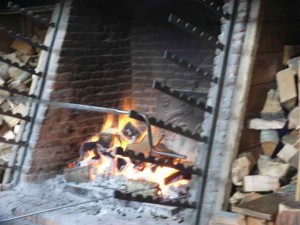 As we start to get into the autumn and the need for heat in our homes and workplace becomes important it got me thinking about a large fire I saw a few months ago at Hampton Court, near London.
As we start to get into the autumn and the need for heat in our homes and workplace becomes important it got me thinking about a large fire I saw a few months ago at Hampton Court, near London.
The fire in question was huge and was in the kitchen of this wonderful old palace. Each side there is a large stock of logs ready to fuel the fire. In the picture you may just see the iron bars that held the spits where various meats were roasted ready for the dinning rooms. A real kitchen where the responsibility of feeding vast numbers of people fell – and often with such an eminent and demanding hunger there would be little excuse for not delivering what was required.
As we know if we create a new fire it has lots of flames once it has started to take hold but the heat is really quite weak. It is not until the fire has taken hold properly and there is a good stock of logs that have started to burn that the intense heat starts. This heat does not come from the blazing flames.
It reminds me of our businesses – when we start up there is a lot of activity, often much in the way of ‘flames’ that are very visible but as we have only just got going there is not much residual ‘heat’ to keep things going. We have to keep fanning the fire, tending each glimmer of opportunity, adding more fuel, sometimes realizing we need more fuel at the ready. It is not until we are well established that the residual heat starts to make things really happen – that deep heat of a fire that has been given the fuel it needs, the care and attention to make sure that it stays alight, and the time to settle down. It is the bed of hot embers that making things cook even though they do not have all of the flames that lick into the air. Sadly, if we are a little complacent we fail to add more fuel to keep the embers replenished. Sometimes we fail to have the generosity to add more fuel to keep the fire at optimum temperature and size.
I have seen so many people in work try to save fuel in their investment in themselves and their business that it really starts to impact on the ‘heat’ they give out to their clients. The lack of new learning many mean that the fire can no longer satisfy the needs of the people who seek their help.
The false economy of saving the cost of a little learning and development fuel can sometimes mean the loss of a valued client, a new opportunity is lost, and in some cases the whole business falters.
So just a few questions:
- Are you keeping the new learning well piled like a good fire needs a well-stocked pile of logs?
- Is the ‘heat’ you are generating enough to satisfy your clients, or has your fire started to get a little too small?
- Is now a good time to invest in some more development?
- If not now when?
As the chill of winter starts to set in do make sure that the heat in your business fire is good enough to keep you and your clients warm over the coming months.
If you need some ‘fuel’ do get in touch – you may just discover I stock what you need.
My good wishes,
Peter